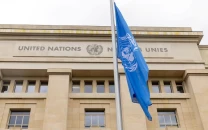Bangladesh SC restores Jamaat-e-Islami
Dhaka replaces ousted PM's father portrait from banknotes

Bangladesh on Sunday restored the registration of the largest Islamist party, allowing it to take part in elections, more than a decade after it was removed under the now-overthrown government.
The Supreme Court overturned a cancellation of Jamaat-e-Islami's registration, allowing it to be formally listed as a political party with the Election Commission.
"The Election Commission is directed to deal with the registration of that party in accordance with law," commission lawyer Towhidul Islam told AFP.
Jamaat-e-Islami party lawyer, Shishir Monir, said the Supreme Court's decision would allow a "democratic, inclusive and multi-party system" in the Muslim-majority country of 170 million people.
"We hope that Bangladeshis, regardless of their ethnicity or religious identity, will vote for Jamaat, and that the parliament will be vibrant with constructive debates," Monir told journalists.
After Sheikh Hasina was ousted as prime minister in August, the party appealed for a review of the 2013 high court order banning it.
Sunday's decision comes after the Supreme Court on May 27 overturned a conviction against a key leader of Jamaat-e-Islami, A.T.M. Azharul Islam.
Hasina banned Jamaat-e-Islami during her tenure and cracked down on its leaders.
In May, Bangladesh's interim government banned the Awami League, pending the outcome of a trial over its crackdown on mass protests that prompted her ouster last year.
Meanwhile, Bangladesh on Sunday issued new banknotes to replace designs featuring its founding president, the father of ousted prime minister Sheikh Hasina who was overthrown last year.
"Under the new series and design, the notes will not feature any human portraits, but will instead showcase natural landscapes and traditional landmarks," Bangladesh Bank spokesman Arif Hossain Khan told AFP.
Among the designs in the Muslim-majority nation are images of Hindu and Buddhist temples, as well as historical palaces.
They also include artwork of the late painter Zainul Abedin, depicting the Bengal famine during British colonial rule.
On Sunday, notes for three of the nine different denominations were released.
"The new notes will be issued from the central bank's headquarters, and later from its other offices across the country," he added.
"The other denominations of the notes with new designs will be released in phases".
Existing notes and coins will remain in circulation alongside the new notes.
It is not the first time that the design has changed to reflect changing politics.



















COMMENTS
Comments are moderated and generally will be posted if they are on-topic and not abusive.
For more information, please see our Comments FAQ